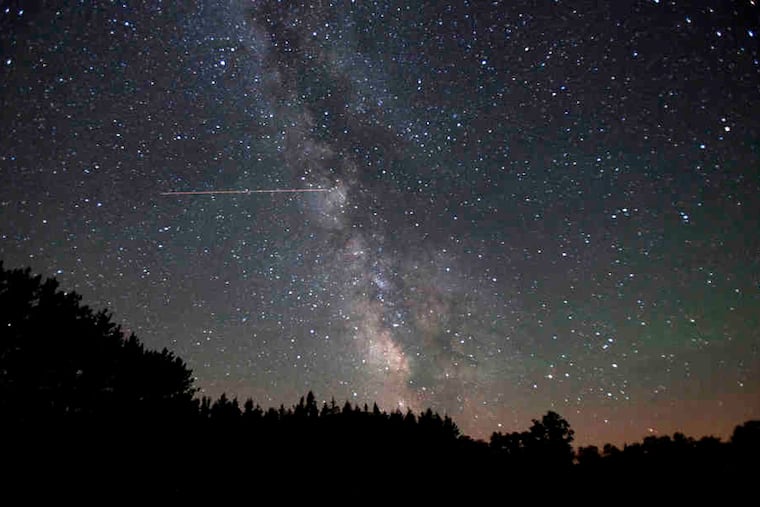A resplendent night sky
A well-traveled stargazer finds a bit of astronomical bliss in north central Pennsylvania.

As a stargazer, I know that I’ve been very fortunate. I’ve seen Orion hanging upside down above a strip of sand in one of the outer islands of Tuvalu in the South Pacific. I’ve watched the rippling curtain of the northern lights from a rooftop in Tromsø, Norway. I have traveled to 20 countries on six continents to document stories about water resources and climate change, yet some of the best star-watching I’ve seen is right here in our backyard at Cherry Springs State Park.
I visited Cherry Springs in Coudersport, Pa., on a clear evening last month. The park — about a five-hour drive from Philadelphia, not far from the New York border — was named for the black cherry trees that once adorned its land. In 2008, the International Dark-Sky Association designated it a Gold Level International Dark Sky Park — meaning that there is such a low level of light pollution that after dark, the sky opens to reveal nearly 360 degrees of beauty.
Unsurprisingly, visits to Cherry Springs exploded during the pandemic. On nights when the moon is new, the stars are resplendent.
The idea to visit came from a friend. “Do you like stargazing?” she asked, already knowing the answer. She texted me the coordinates and I was off.
» READ MORE: Stargazing around Philadelphia: Everything you need to know
At the park, I sat on a picnic table under a sunset of deepening yellows that lengthened to orange and then red. I eased into my senses, noting the far-off laughter of my neighbors: a mix of Amish and non, women in bright dresses, a family with a clothesline strung out in front of their tent, a few campfires perfuming the evening air. Slowing down and paying attention is the smallest of blessings.
The fireflies came out first, pinpricks of yellow against the silhouetted trees, stitching the night. Blue gathered overhead. I don’t remember ever being quite this excited for the sky to darken, for the sunset to finish up its show, and, please, exit stage west already.
Eventually, it was quiet enough to hear a barred owl off in the woods — “Who cooks for you?” — a song I can recognize anywhere. A single car passed on the road by the campsite, churning the wind. The whole evening seemed to be holding its breath, waiting.
At last, the first coveted stars arrived, those long-awaited guests. Pinpricks. A gathering assembly of light some 4,000 years old. I used only the red setting on my headlamp to preserve my night vision, bundled myself in a blanket, and looked at the sky as it unspooled. The fireflies around me played lazily in the field.
From behind distant trees, the full moon rose, a burning orange — the face of it almost levitating. The voices of 50 or so strangers sounded closer: everyone bubbly, some giggling. For once, I was surrounded by people not looking into the faces of their screens, but instead at a strawberry moon and the darkness beyond. We were joined in the serenity of the moment. Of looking up. Of telling stories under the sky — something that humans have done for thousands of years.
“It’s comforting to feel this infinitesimally small. It helps to gain perspective.”
It’s comforting to feel this infinitesimally small. It helps to gain perspective.
It felt, for that fleeting evening, that nothing could touch us — not inflation, not gun violence, not war. I felt myself breathing more deeply, my shoulders unwinding from my ears.
Cherry Springs is far from any city, and surrounded by the Susquehannock State Forest. You won’t find streetlights on the roads. Light pollution is a nuisance not just for eager stargazers, but also for animals like raccoons, coyotes, bats, deer, and migrating birds that rely on darkness and can become disoriented by artificial light.
And it’s not just streetlights we have to be worried about. An overabundance of satellites — more than 4,500 at last count — makes stargazing more difficult. The sky belongs to all of us, and should be protected.
I did not see the Milky Way — like a glass of spilled milk — in the dome of the Cherry Springs sky, but I wanted to. The bright light of the full moon obscured it. This will just be my excuse to come back. (And for my fellow lovers of looking up, the next super moon will be on July 13.)
Under Orion that night, though, I made a pact. I will visit as many state parks in Pennsylvania as I can. There are 121, and I am convinced that each one is a jewel. Only 118 or so to go.